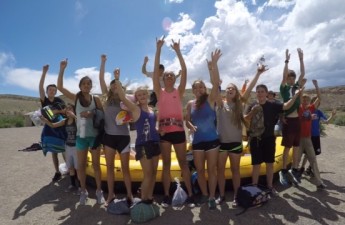
Did you miss our free January webinar, Community Stewardship through Experiential Education? You can watch it here today! Learn how communities can implement a community-based approach to watershed conservation using experiential education as a primary tool.
During this free 30 minute webinar, River Restoration Adventures for Tomorrow’s Executive Director Dan Omasta will highlight the multi-faceted, community-based approach to watershed conservation they have implemented, including a series of methods that can be used by communities across the country to bolster projects along local rivers. Much of the dialogue is focused on a series of trips that empowered a wide range of river runners – high schools students to civilians with disabilities – to better appreciate and protect the ecosystem on the Gunnison River near Delta, Colorado. Watch it today!
Participants will learn:
1. How and why it is important to Incorporate service into experiential education
2. The three legs of sustainability (environmental, economic, social) as core principles of experiential education & the model RRAFT has developed
3. The successes and challenges of collaboration and stakeholder development as it relates to experiential education and RRAFT’s work in the Gunnison River watershed.
Learn more about RRAFT and watch a short film about them.
Transcribed Questions and Answers:
What kind of time commitment to do schools give to participating with the RRAFT program?
- The level of commitment ranges depending on the type of project and number of trips. Typically, there is a relatively low amount of time spent on the behalf of the school. For example, RRAFT coordinated directly with two teachers from Delta and Cedaredge High school to coordinate project/learning opportunities, dates, safety, trip waivers and a packing list. One important commitment the schools provided was transportation – the school used a district bus to transport students to and from the river.
Can you speak to the knowledge base and skill set needed before starting this type of program?
- It depends on who is ultimately designing the program. For example, a land manager could reach out to schools to identify a teacher who would be interested in bringing their class on to the river for a day of service and learning. Much of the curriculum would be left up to the educator, while the service project would be managed by the land management office. This type of scenario could work in reverse as well if the teacher reached out to the land management agency.
- The development of RRAFT took more resources and skill set. As a certified river outfitter, RRAFT is required to have trained river guides, insurance, outdoor emergency medical training, equipment, etc. As a non-profit, the organization also focuses on fundraising, social media, strategic leadership and capital development to be successful. For the environmental education piece, RRAFT guides have a strong knowledge set when it comes to rivers, riparian ecosystems, local anthropology, geology, etc. During the trips they weave different topics into conversation. RRAFT focuses on working directly with the teachers and experts to provide more in-depth learning opportunities for the students, ensuring the experience fits well with what the students are learning in the classroom.
Photo Credit: Gunnison River, CO, River Restoration Adventures for Tomorrow
